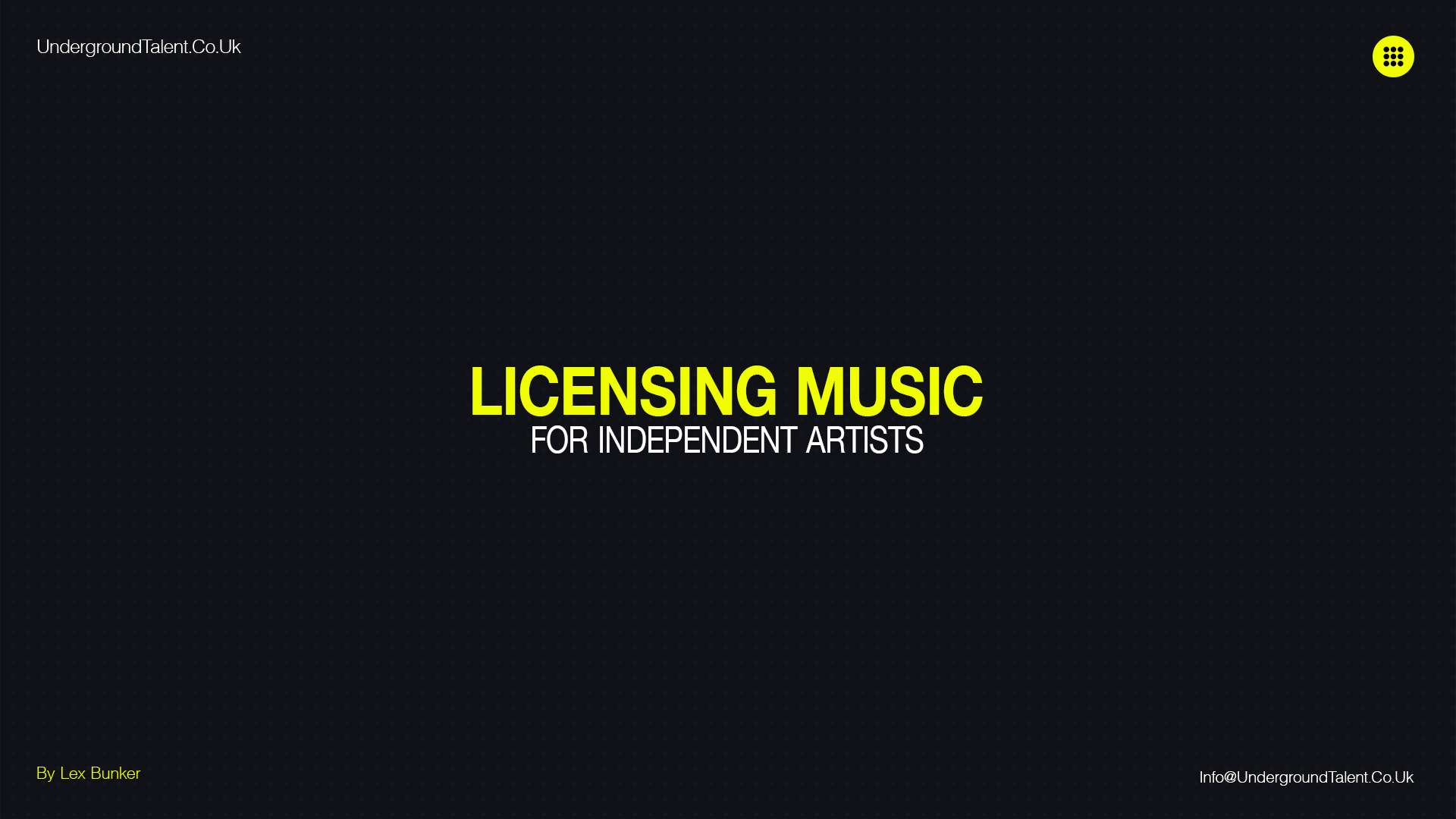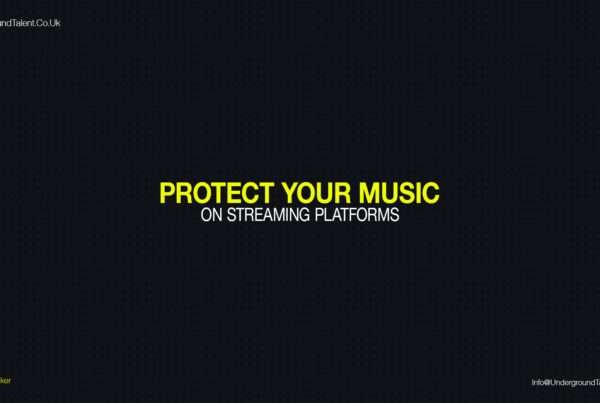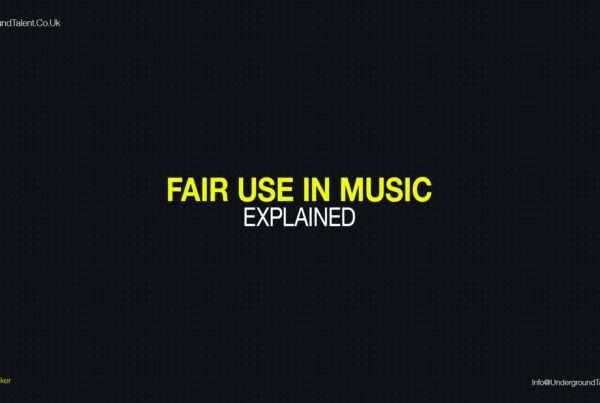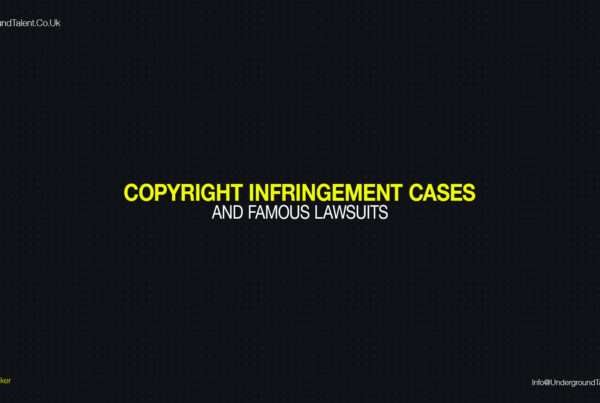Music Licensing can be a game-changer for independent artists. It opens up new revenue streams and gets your music heard by a wider audience. This guide will walk you through the essentials of music licensing, from understanding the basics to maximizing your income.

Key Takeaways
- Music licensing allows artists to earn money by letting others use their music in various media.
- Different types of licenses exist, including sync, performance, and master licenses.
- High-quality recordings and proper metadata are crucial for successful licensing.
- Networking and using music libraries can help you find licensing opportunities.
- Understanding and negotiating licensing agreements are essential for protecting your rights and maximizing income.
Understanding Music Licensing Basics
What is Music Licensing?
Music licensing is a legal agreement where a composer or author grants permission for their copyrighted music to be used in various commercial projects in exchange for a licensing fee. This is a great way for songwriters and composers to earn money from their original music. Licensing can cover uses in TV shows, films, YouTube videos, commercials, video games, and more.
Licensing your music allows it to be heard in different types of content, expanding your audience and potential income.
Types of Music Licenses
There are several types of music licenses, each serving a different purpose:
- Sync License: Allows music to be used in sync with visual media like movies or commercials.
- Public Performance License: Needed for music played in public spaces like restaurants or bars.
- Print Rights License: Grants rights to print sheet music.
- Master License: Similar to a sync license but specifically for pre-recorded songs.
- Theatrical License: Required for live stage performances.
Key Terms in Music Licensing
Understanding key terms in music licensing is crucial:
- Licensor: The owner of the copyrighted music (you, the musician).
- Licensee: The party seeking to use the music (e.g., a filmmaker or advertiser).
- Term: The duration for which the license is valid.
- Territory: The geographical area where the music can be used.
- Exclusivity: Whether the license is exclusive or non-exclusive.
Knowing these terms helps you navigate the complexities of music licensing agreements and ensures you get the best deal possible.
Preparing Your Music for Licensing
Ensuring High-Quality Recordings
Before you even think about licensing, make sure your music is professionally recorded and mastered. Music supervisors and licensing agents are looking for polished, high-resolution tracks. Anything less will likely be ignored. Ensure you have both vocal and instrumental versions of your songs ready. Instrumentals are crucial for sync licensing, especially if a supervisor needs to mute vocals during dialogue in a scene.
Metadata and Documentation
Metadata is the information embedded in your music files that helps identify the track, artist, album, and other important details. Proper metadata is essential for licensing. Include details like track name, artist name, album name, genre, and release date. This makes it easier for music supervisors to find and use your tracks. Also, keep a spreadsheet of all your available music for licensing, including metadata and documentation.
Registering with Performing Rights Organizations
Registering your music with a Performing Rights Organization (PRO) like BMI, ASCAP, or SESAC is a must. These organizations help track the usage of your music and collect royalties on your behalf. This step ensures you get paid whenever your music is used commercially. It’s a simple but crucial part of the licensing process.
Being organized and prepared can make the difference between landing a licensing deal and being overlooked. Make sure your music is ready for the big leagues.
Finding Music Licensing Opportunities
As an independent artist, finding the right opportunities to license your music can be a game-changer. Networking with industry professionals is a crucial first step. Attend music conferences, join online forums, and participate in local music events to meet people who can help you get your music placed. Building relationships with music supervisors, producers, and other artists can open doors you never knew existed.
Another effective strategy is using music libraries and licensing agencies. These platforms act as intermediaries between you and potential clients, making it easier to get your music in front of the right people. Websites like Broadjam offer music licensing and placement opportunities in TV and film, updated weekly. This can be a great way to get your music noticed without having to do all the legwork yourself.
Direct outreach to music supervisors is another avenue worth exploring. Platforms like LinkedIn and Instagram can be useful for this. Research and identify supervisors who work on projects that align with your music style. Send them a concise, professional pitch that includes links to your best tracks. Persistence is key here; don’t be discouraged by initial rejections.
Remember, the main thing is to get your music out there and find a fair deal that works for you.
Understanding Music Licensing Agreements
When negotiating licensing deals, it’s crucial to understand the terms and conditions of the agreement. A licensing agreement outlines the rights and responsibilities of both parties. It typically includes details about the scope of use, duration, and any exclusivity clauses. Make sure to read the contract carefully and seek legal advice if needed.
Setting Your Fees
Determining the right fee for your music can be challenging. Consider factors such as the type of media, the duration of use, and the territory. It’s also important to know the industry standards and what other artists are charging. One option is to negotiate a better contract with their record label, one that includes higher royalties and a greater degree of control over their music.
Negotiating Terms and Conditions
When negotiating terms and conditions, be clear about your expectations and limitations. Discuss the scope of the license, including where and how your music will be used. Once an artist or band has piqued the interest of a record label, the negotiation phase begins. This stage involves discussions about the terms and conditions, such as exclusivity and payment terms.
Remember, negotiating a licensing deal is about finding a balance that benefits both parties. Be prepared to compromise, but also know your worth and stand firm on key points.
Additional Tips
- Research: Understand the market and what similar artists are charging.
- Legal Advice: Consult with an intellectual property lawyer to ensure your rights are protected.
- Clear Communication: Be transparent about your needs and expectations.
- Flexibility: Be open to negotiation but know your limits.
By following these steps, you can secure a fair and beneficial licensing deal for your music.
Working with Music Licensing Agents
Benefits of Using Music Licensing Agents
Licensing agents can be a valuable asset for independent artists. They help you navigate the complex world of music licensing, ensuring that your music gets placed in the right projects. One of the main benefits is that they handle the contract and paperwork, saving you time and effort. Additionally, they have established relationships with industry professionals, which can open doors that might otherwise remain closed.
Choosing the Right Agent
Not all agents are created equal, so it’s crucial to do your due diligence. Look for agents who have a proven track record in your genre of music. Ask for recommendations from other artists and check their client list. It’s also important to have a clear understanding of their fee structure and what services they offer.
What to Expect from Your Agent
When you work with a licensing agent, you can expect them to pitch your music to various media outlets, including film, TV, and commercials. They will also negotiate terms and conditions on your behalf, ensuring that you get the best possible deal. Keep in mind that while they handle many aspects of the licensing process, you should still be involved in key decisions.
Working with a licensing agent can significantly increase your chances of getting your music placed in high-profile projects. However, it’s essential to choose an agent who understands your music and has the right connections to help you succeed.
Music Licensing for Different Media
Film and Television
Licensing your music for film and television can be a lucrative opportunity. When a movie company wants to use a portion of your song, they need to obtain a synchronization license. This allows them to combine your music with visual images. It’s essential to clearly define the scope of the license, negotiate the terms, and draft a licensing agreement. Working with an intellectual property lawyer is advisable to ensure all legal aspects are covered.
Commercials and Advertisements
Using music in commercials and advertisements requires a different approach. Brands need to know about legally using music on social media platforms and other advertising mediums. They often seek a master license, which permits to use a pre-recorded version of a song. This type of license is crucial for ensuring that the music is used correctly and legally in various commercial projects.
Video Games and Apps
The video game industry offers unique opportunities for music licensing. Game developers often look for original music to enhance the gaming experience. Licensing your music for video games involves negotiating terms that cover the duration, territory, and exclusivity of the license. It’s important to understand the specific needs of the gaming industry and tailor your music to fit those requirements.
Licensing your music for different media can open up numerous revenue streams and increase your exposure as an artist. Be sure to understand the specific requirements and legalities involved in each type of media to maximize your success.
Protecting Your Music Rights
Understanding the basics of copyright is crucial for any independent artist. Copyright gives you the exclusive rights to reproduce, distribute, perform, and display your work. This means that no one else can use your music without your permission. Copyright protection is automatically granted when you record your song, but registering with the U.S. Copyright Office provides additional benefits, such as the ability to file a federal lawsuit for infringement.
If someone uses your music without permission, you have the right to take legal action. The first step is to ensure your music is registered with the Copyright Office. This registration gives you the leverage needed to bring a case to court. There are two main avenues for legal action: federal court and small claims court. Federal court can award up to $150,000 per infringement, but it requires an attorney. Small claims court, established by the CASE Act, is a more accessible option, allowing creators to represent themselves and recover up to $30,000 per case.
Navigating the legal side of your music career can be complex. It’s advisable to consult with an attorney to understand your rights fully. There are also various resources available to help you, such as the Copyright Office and organizations like ASCAP, BMI, and SESAC. These organizations can assist you in tracking the use of your music and collecting royalties.
Protecting your music against infringement and plagiarism is essential for ensuring you receive the royalties you are legally entitled to when your music is used.
Maximizing Your Music Licensing Income
Diversifying Your Music Catalog
To maximize your licensing income, it’s crucial to have a diverse music catalog. This means creating songs in various genres, moods, and tempos. A varied catalog increases your chances of landing more licensing deals. Think about different uses for your music, such as background scores, theme songs, or commercial jingles.
Marketing Your Music
Marketing is key to getting your music noticed. Utilize social media platforms, create a professional website, and engage with your audience. Share snippets of your work and behind-the-scenes content to keep your fans engaged. Effective marketing can significantly boost your visibility and attract more licensing opportunities.
Tracking and Collecting Royalties
Once your music is licensed, it’s important to track and collect your royalties. Use tools and services that help you monitor where and how your music is being used. This ensures you get paid for every use of your music. Proper tracking can prevent loss of income and ensure you receive all the royalties you’re entitled to.
Remember, the more organized and proactive you are, the more successful you’ll be in maximizing your licensing income.
Case Studies and Success Stories on Music Licensing
Independent Artists in Film
Many independent artists have found success by getting their music featured in films. For example, the song “1234” by Feist was used in an iPod Nano ad, which significantly boosted her career. This sync placement led to four Grammy nominations and brought her music to a global audience.
Successful Commercial Placements
Commercials offer another lucrative avenue for indie artists. A notable example is the use of Badfinger’s 1972 hit “Baby Blue” in the final scene of “Breaking Bad.” This placement not only revived interest in the song but also introduced it to a new generation of listeners.
Breakthroughs in Video Game Licensing
Video games are an emerging platform for music licensing. Independent artists can gain substantial exposure and income through this medium. The game “Life is Strange” featured several indie tracks, helping those artists reach a broader audience and gain new fans.
Licensing your music can open doors you never imagined, from film and TV to commercials and video games. The opportunities are vast and varied, offering multiple paths to success for independent artists.
Common Challenges and How to Overcome Them
Dealing with Rejections
Rejection is a common part of the music licensing journey. It’s important to not take it personally. Instead, view each rejection as a learning opportunity. Ask for feedback when possible and use it to improve your future submissions. Remember, even the most successful artists faced numerous rejections before their big break.
Managing Multiple Licenses
Handling multiple licenses can be overwhelming. To stay organized, consider using a digital tool or spreadsheet to track your licenses, deadlines, and payments. This will help you avoid missing important dates and ensure you get paid on time. Additionally, keeping detailed records can protect you in case of any disputes.
Staying Updated with Industry Trends
The music industry is constantly evolving. To stay relevant, make it a habit to follow industry news and trends. Subscribe to music industry blogs, attend webinars, and network with other professionals. Modernizing your approach can give you a competitive edge and help you adapt to changes more effectively.
Staying informed about the latest trends and technologies can significantly impact your success in music licensing.
| Challenge | Solution |
|---|---|
| Rejections | Seek feedback and improve submissions |
| Multiple Licenses | Use digital tools for organization |
| Industry Trends | Follow news, attend webinars, network |
By addressing these common challenges head-on, you can navigate the music licensing landscape more effectively and increase your chances of success.
Conclusion to Music Licensing
Licensing your music can open up a world of opportunities for independent artists.
By understanding the basics of music licensing, building relationships with licensing companies, and staying organized, you can successfully navigate this complex landscape. Whether you choose to go it alone or seek help from a third-party licensing agent, the key is to be proactive and persistent.
Remember, every time your music is used in a film, TV show, or commercial, it’s a chance for more people to hear your work and for you to earn money. So, take the knowledge you’ve gained from this guide and start licensing your music today.
Your next big break could be just around the corner!
Frequently Asked Questions on Music Licensing
What is music licensing?
Music licensing is when you permit someone to use your music in a project, like a movie or a commercial, in exchange for payment.
What are the different types of music licenses?
There are several types of music licenses, including sync licenses, performance licenses, mechanical licenses, and master licenses.
How can I prepare my music for licensing?
Make sure your recordings are high-quality, have all the necessary metadata, and register your music with a performing rights organization (PRO).
What is a performing rights organization (PRO)?
A PRO is a group that helps songwriters and musicians get paid when their music is played in public places like on the radio or in restaurants.
How do I find licensing opportunities for my music?
You can network with industry professionals, use music libraries and licensing agencies, or reach out directly to music supervisors.
What should I know about negotiating a licensing deal?
Understand the terms of the agreement, set your fees, and be clear about the conditions, like how long they can use your music and where.
What are the benefits of using a licensing agent?
A licensing agent can help you find more opportunities, negotiate deals, and handle the legal details, saving you time and effort.
How can I protect my music rights?
Register your music with a copyright office, monitor its use, and seek legal help if someone uses your music without permission.
Don’t Miss
- Best MIDI Keyboards for Electronic Music Production in 2024
- Best Speaker Isolation Pads for Home Studio
- Mixing Electronic Music: Fundamentals and Objectives
- Promote Your Music on TikTok: The Ultimate Guide
- Electronic Music Promotion – Unlock Massive Growth with Hypeddit
Producing Techno? Get Your Free Sample Packs.
Dive into electronic music production with our newly released “Free Techno Tools V1” and “Free Techno Tools V2” sample packs. These packs are full of high-quality sounds that will add a professional touch to your tracks. If you’re looking to expand your sound library, these free sample packs are perfect for every techno fanatic. Click on the links below to access these fantastic resources and elevate your production game today!
Connect With Us.
Join our vibrant community for more wisdom and updates:
And Always Remember…
Have Fun & Be Creative!




